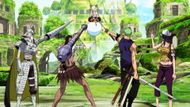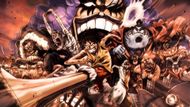For the longest time, I tried to avoid watching One Piece, although everyone around me seemed to talk about it with a kind of reverence usually reserved for sacred texts. So I thought it was time for me to give it a try. But then I saw the episode count, over a thousand. It felt like standing at the base of a mountain with no peak in sight.
And yet I decided to start it. A few episodes in, I was hooked. Somewhere along the way, I realized One Piece isn’t meant to be binged in a week. It’s not built for instant gratification.
Maybe that is the whole point. It is understandable that with over one thousand episodes, multiple movies, and over a thousand manga chapters, anyone would feel daunted. But here’s what most people miss when they use its length as an excuse to skip it: that length is what allows the series to be so immersive, so layered, and so emotionally powerful.
Eiichiro Oda, the creator of this series, has created a living, breathing ecosystem of cultures, histories, governments, economies, and people. This vast and intricate world he has built is not just for show, and it should definitely not be a world where things happen randomly, everything connects, and everything matters.

In this series, even the Skypiea arc many try to skip, introduces the concept of “Poneglyphs” and a forgotten history that becomes crucial much later. It is as if Oda never wastes time. Every arc lays a thread, and those threads eventually tie into the massive tapestry that is the One Piece world.
Also, most of the pirate stories show pirates as the villains. This series flips that expectation on its head. The so-called “pirates” in this world are often the most compassionate, freedom-loving individuals you’ll find, while the ones meant to uphold order, the World Government and the Marines, can be deeply corrupt, elitist, and cruel.
Additionally, if viewers just end up reducing the story to be just about pirates looking for treasure, I believe they are missing 90% of what it has to offer. But the story doesn’t stop there, it has explored themes like Freedom vs. control, Racism, Class struggle and poverty, and even Truth vs. propaganda.

These are just some of the themes that have been recurring. Oda has ensured that every theme is layered in such a way that it doesn’t feel like a lecture. Instead, it sneaks up on you. Furthermore, if we look at shonen protagonists, they often follow a simple path: get stronger, beat the next boss, repeat.
One Piece breaks that mold. Luffy and his crew do get stronger, yes, but the real growth is emotional, psychological, and personal. Even the villains aren’t static. Characters like Buggy, Crocodile, and even Doflamingo get layers of backstory that explain their motivations. In One Piece, everyone has a reason. Everyone has a past. And you feel the weight of those pasts in every decision they make.
Why should One Piece be watched at least once without binge-watching it?

We live in a world where binge-watching is normalized, and the audience has been conditioned to crave instant payoff. One Piece refuses to play by those rules. It demands your time. It asks for your patience. But in return, it offers one of the most rewarding narratives in all of fiction.
Skipping arcs or rushing through episodes means missing the magic in the little things that make One Piece special. The small character moments. The emotional callbacks. The slow burn of worldbuilding. Oda plants seeds that take hundreds of chapters to blossom, and when they do, the payoff is enormous.
In conclusion, if you’re wondering whether it’s too late to start One Piece, it’s not. This anime must be an experience to be lived. Yes, One Piece is a marathon. But when you finally reach those emotional peaks, you’ll understand something crucial. It was never about the dopamine rush of finishing a show, it was about enjoying every second of it. And that’s a journey worth every single episode.
